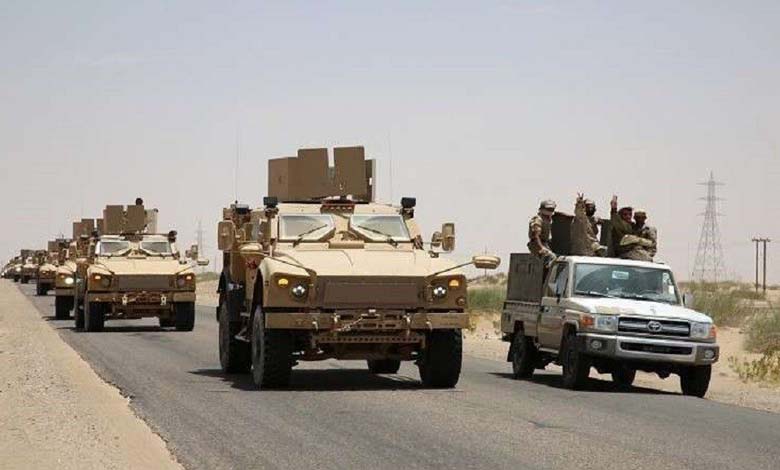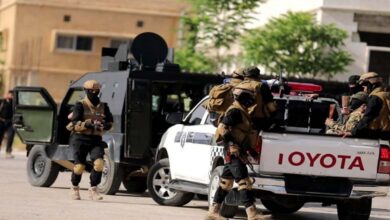In a surprising decision, the Houthis threaten to target Saudi Arabia
The leader of the Iran-backed group justifies his threat to target the Kingdom's airports and banks in response to the Yemeni government's decision to relocate banks from areas controlled by the Houthi group, distancing itself from negotiations in Muscat

Houthi leader Abdul-Malik al-Houthi has resumed his attacks on Saudi Arabia and threatened to target it militarily despite Riyadh’s role in bringing peace to the war-torn country. This reveals the intentions of the rebellious group loyal to Iran to escalate tensions, evade peace efforts, and view negotiations as merely buying time for further armament.
On Sunday, Abdul-Malik al-Houthi threatened to target Saudi airports and banks in response to decisions by the Yemeni government, supported by Riyadh, to relocate banks from areas controlled by the Iran-aligned group, a move that could undermine Muscat negotiations.
Oman has hosted several rounds of negotiations between the Houthi group and the Yemeni government as part of international efforts to establish peace in the war-torn country. However, the recent escalation by the rebels has prevented the implementation of a roadmap aimed at achieving a comprehensive political settlement to the Yemen crisis, with the latest Houthi threats serving as clear evidence of the group’s lack of desire to pursue peace as a strategic option.
The Houthi leader justified his stance by stating that the Saudi decision was made under American pressure, stating in a recorded speech, “The Americans continue their attempts to entangle Saudi Arabia after their military failure in Yemen, sending us messages that they will push the Saudi regime towards aggressive actions.”
He added, “One of the main focuses of the Americans is the economic sector because its damage affects everyone,” accusing the Saudi regime of committing what he described as a “foolish step” by moving banks from Sanaa, adding, “No one in the world thinks in this way… the Americans know the negative impact of moving banks on the Yemeni people’s livelihoods, currency, and prices in the country.”
He launched a series of accusations against Riyadh, saying, “Saudi Arabia, after the bank relocation, moved to disable Sanaa airport and halt flights despite their limited and narrow scope,” adding, “We will tell the banks in Riyadh to move and go, will you accept this, and consider it logical, so why do you want to impose it on our country?”
Saudi Arabia responded, saying, “We will match everything with its equivalent… banks with banks, Riyadh airport with Sanaa airport, and ports with ports.”
Last May, the Yemeni Central Bank, affiliated with the internationally recognized legitimate government, decided to halt dealings with six of the largest banks in the country under Houthi control in the capital Sanaa. The rebel group said the decision to stop dealing with these banks came under Saudi orders.
Recently, financial conflict has escalated between the legitimate government and Iran-backed rebels within the economic war between the two sides, affecting the living conditions of most Yemeni citizens living below the poverty line.
The Houthis deny Saudi efforts to bring peace to Yemen and the region and its positive initiatives to stop violence and fighting. Earlier this year, they refused to sign a proposed peace roadmap for Yemen without Saudi Arabia as a principal party rather than a mediator.
Observers question Iran’s role in inciting the Houthis to target Saudi Arabia despite talk of a positive development in relations between the two countries since the normalization agreement.
-
Between the Houthis and the Muslim Brotherhood… Playing Openly
-
Organ trade… A new suspicious relationship connecting the Houthis with the Muslim Brotherhood… Details
Several diplomatic sources have recently spoken of Riyadh’s payment of a full year’s salaries to all government employees in all regions of Yemen according to 2014 lists, resuming the export of Yemeni oil and gas to restore the economy, covering the salary item from oil exports.
The Houthis have the capabilities to disrupt international maritime navigation in the Red Sea as they have managed to target Israel, about 2,000 kilometers away from Yemen, with missiles and drones intercepted by the Israeli army.
-
The Houthis carry out the largest attack in the Red Sea since the Gaza war
-
The Houthis plan to obliterate the identity of the old city of Sanaa… and UNESCO intervenes
After nine years of fighting, Saudi Arabia’s policy towards Yemen has changed as Crown Prince Mohammed bin Salman explicitly stated his desire for his country to exit this costly war. Negotiations between Saudi Arabia and the Houthis coincided with a new phase of rapprochement between Riyadh and Tehran.












